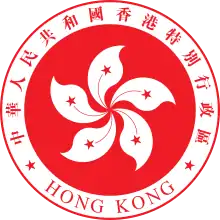Committee for Safeguarding National Security of the Hong Kong Special Administrative Region
The Committee for Safeguarding National Security of the Hong Kong Special Administrative Region is a committee established by the Government of Hong Kong as a result of the enactment of the Hong Kong national security law by the Standing Committee of the National People's Congress.[1] It is supervised by and accountable to the Central People's Government (State Council).
| 香港特別行政區維護國家安全委員會 | |
 | |
| Agency overview | |
|---|---|
| Formed | 3 July 2020 |
| Jurisdiction | Central People's Government (State Council) |
| Agency executives |
|
| Committee for Safeguarding National Security of the Hong Kong Special Administrative Region | |||||||||||
|---|---|---|---|---|---|---|---|---|---|---|---|
| Office for Safeguarding National Security of the CPG in the HKSAR | |||||||||||
| Traditional Chinese | 香港特別行政區維護國家安全委員會 | ||||||||||
| Simplified Chinese | 香港特别行政区维护国家安全委员会 | ||||||||||
| |||||||||||
| Office for Safeguarding National Security | |||||||||||
| Traditional Chinese | 港區國安委 | ||||||||||
| Simplified Chinese | 港区国安委 | ||||||||||
| |||||||||||
 |
|
Politics and government of Hong Kong |
|
Related topics |
.svg.png.webp) |
|---|
| This article is part of a series on the politics and government of China |
|
|
The committee is chaired by the Chief Executive, as stated in Article 13 of the law.[1] The committee's other members are the Chief Secretary for Administration, the Financial Secretary, the Secretary for Justice, the Secretary for Security, the Commissioner of Police, the head of the Department for safeguarding national security of the Hong Kong Police Force, the Director of Immigration, the Commissioner of Customs and Excise, and the Director of the Chief Executive’s Office.[1]
Organisation
On 2 July 2020, Eric Chan was appointed as secretary-general of the committee.[2]
On 3 July 2020, a Hong Kong government spokesperson stated that the Committee for Safeguarding National Security of the Hong Kong Special Administrative Region was formally established with Carrie Lam as chairwoman and Eric Chan as secretary-general. The other members are Matthew Cheung Kin-chung (Chief Secretary for Administration), Paul Chan Mo-po (Financial Secretary), Teresa Cheng (Secretary for Justice), John Lee Ka-chiu (Secretary for Security), Chris Tang (Commissioner of Hong Kong Police Force), Edwina Lau Chi-wai (Deputy Commissioner of Hong Kong Police Force and the head of the Department for safeguarding national security of the Hong Kong Police Force), Au Ka-wang (Director of Immigration), and Hermes Tang Yi-hoi (Commissioner of Customs and Excise).[3] Also on 3 July 2020, Luo Huining, the director of the Liaison Office was appointed by the State Council to the role of the committee's National Security Adviser. The creation of this post is stipulated by Article 15 of the national security law.[3][4] The Australian Strategic Policy Institute opined that the post now appeared to be the most powerful position in Hong Kong.[5]
The committee convened its first meeting on 6 July 2020.[6]
Duties and functions of the Committee
Article 14 of the Hong Kong national security law specifies three duties and functions of the committee:
- Analysing and assessing developments in relation to safeguarding national security in the Hong Kong Special Administrative Region, making work plans, and formulating policies for safeguarding national security in the Region;
- advancing the development of the legal system and enforcement mechanisms of the Region for safeguarding national security; and
- coordinating major work and significant operations for safeguarding national security in the Region.
Article 14 further states: "No institution, organisation or individual in the Region shall interfere with the work of the Committee.", and that its decisions are not amenable to judicial review. Article 18 specifies that prosecutors of the division "for the prosecution of offences endangering national security and other related legal work" – established by the same law – have to be approved by the committee prior to their appointment by the Secretary of Justice.[1]
Article 43 stipulates that the committee supervises the implementation of the powers which law enforcement agencies, including the Hong Kong Police force, have under the national security law.
Sanctioning of Committee members by the United States
Carrie Lam, Eric Chan, Teresa Cheng, John Lee, Chris Tang, and Luo Huining were among those sanctioned by the United States Treasury in August 2020 pursuant to the Normalization Executive Order (Executive Order 13936). The order had been issued by US President Donald Trump on 14 July in response to the imposition of the national security law.[7][8] Edwina Lau was sanctioned by the US on 9 November as one of four more officials.[9]
References
- "In full: Official English translation of the Hong Kong national security law". Hong Kong Free Press. 1 July 2020. Retrieved 11 November 2020.
- Leung, Christy; Ng, Joyce (2 July 2020). "Carrie Lam's top aide to head Hong Kong committee for security law". South China Morning Post. Archived from the original on 2 July 2020. Retrieved 3 July 2020.
- "Establishment of Committee for Safeguarding National Security of HKSAR (with photos)". www.info.gov.hk. Hong Kong Government. 3 July 2020. Retrieved 10 November 2020.
- Cheung, Tony (3 July 2020). "National security law: Beijing appoints tough-talking party official Zheng Yanxiong to lead powerful new agency in Hong Kong". South China Morning Post. Archived from the original on 10 July 2020. Retrieved 10 November 2020.
- Meagher, Dominic (14 July 2020). "Has Hong Kong's national security law created secret police with Chinese characteristics?". The Strategist. Archived from the original on 14 July 2020. Retrieved 13 November 2020.
- "National security body meets". www.info.gov.hk. 6 July 2020. Retrieved 10 November 2020.
- Grundy, Tom (7 August 2020). "US sanctions Hong Kong leader Carrie Lam, police chief and 9 other top officials for 'undermining autonomy'". Hong Kong Free Press. Retrieved 18 November 2020.
- "Treasury Sanctions Individuals for Undermining Hong Kong's Autonomy". United States Department of the Treasury. 7 August 2020. Retrieved 10 November 2020.
- Grundy, Tom (10 November 2020). "US hits four more officials over Hong Kong freedoms". Hong Kong Free Press / AFP. Retrieved 10 November 2020.